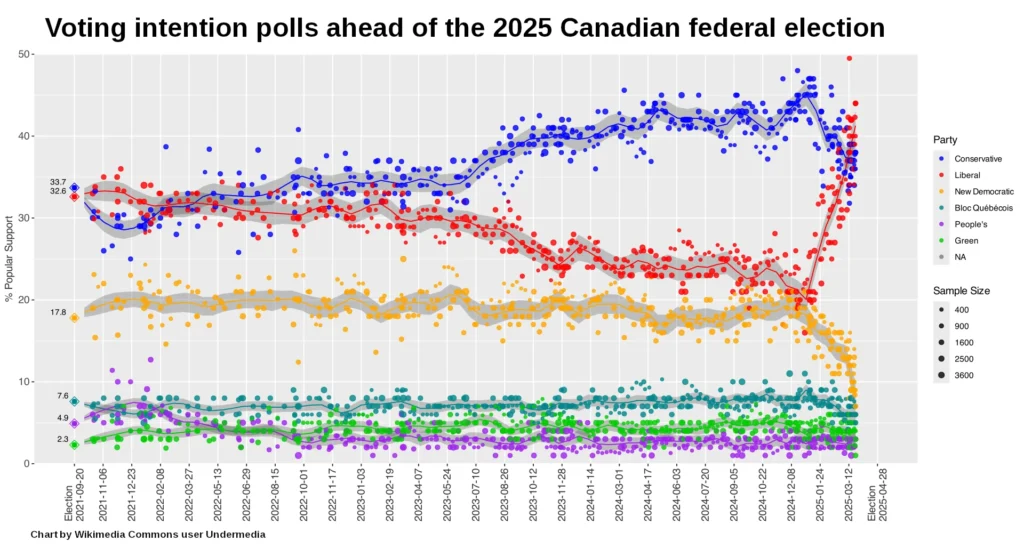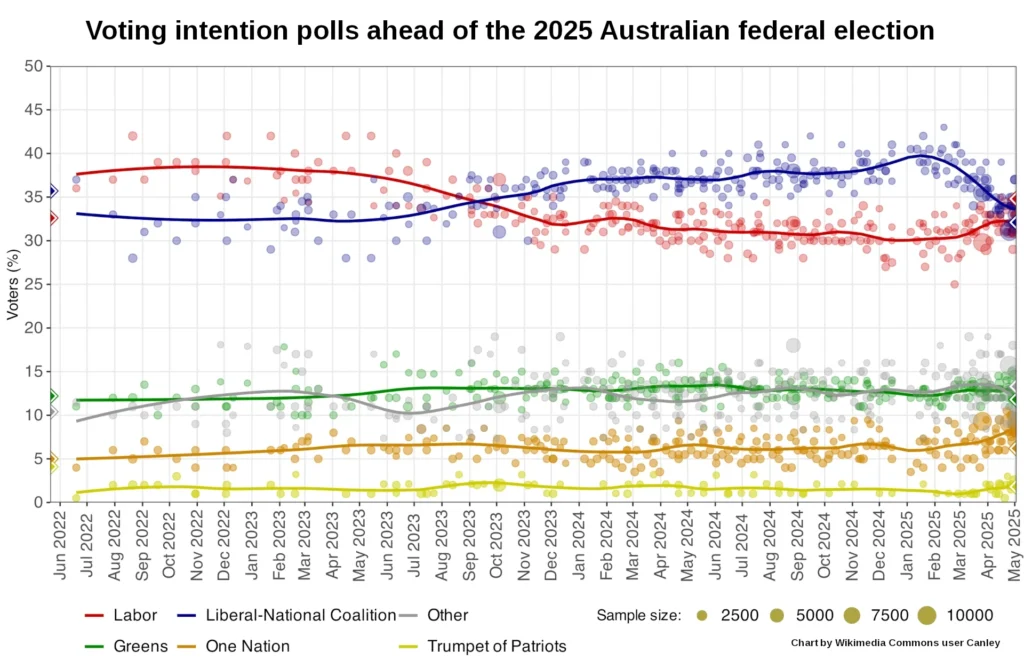Several major elections have been held around the world, each leading to upsets widely attributed to anti-Trump sentiment.
It’s only been four months, so there’s not all that much data to go on, but a pattern is emerging in election results around the globe. While the nationalist, populist, protectionist right was ascendant around the globe last year, it is unexpectedly getting trounced at the polls this year.
We can call this the Trump Counter-Effect.
Canada
The most obvious and dramatic case happened when Canada held its federal election on 28 April 2025.

Until January, the opposition Conservative Party, led by Pierre Poilievre, held a large and widening lead in the polls over the incumbent Liberal Party of Justin Trudeau and his successor, Mark Carney. The social-democratic New Democratic Party, to the left of the more centrist Liberals, followed not far behind.
Poilievre was a shoo-in. His spouse, Anaida, called herself the wife of the future prime minister on social media. Newspaper profiles introduced Canada, and the world, to the next prime minister; only the more cautious added a “likely”, or a question mark.
Then Donald Trump declared rhetorical and economic war on Canada. The US president declared a spurious national emergency to secure the necessary executive power to embark on a trade war, and slapped tariffs on Canada for the flimsiest of reasons.
He repeatedly said Canada could avoid tariffs by becoming the 51st state of the US. He called its prime minister, Justin Trudeau, “Governor Trudeau”.
Phlegmatic, eh?
Canadians are famously phlegmatic. Their most popular interjection is “eh”.
Their drill sergeants shout, “Forward march, eh?”
They can tell entire stories like that. “There I was, chilling at the pub, eh? In walks a mountie, eh? … So anyways, that’s why I’m banned now, eh?”
When I went to Calgary to give a talk some time ago, the temperature was 3°C. Canadians in shorts and T-shirts greeted me: “Nice day, eh?”
It takes a lot to get Canadians worked up, but Trump’s threat of annexation, insults to their prime minister, and nuking a lifetime of amicable free trade between the two countries, did it.
The Trump offensive gave the new leader of the Liberal Party, Mark Carney, the opportunity to make some rousing, quasi-Churchillian speeches about stiff spines and national resolve and Canada not being for sale.
Canadians headed to the polls in droves, recording the highest election turnout in more than 30 years, and the Liberal Party, now led by Mark Carney, won the largest share of the vote by any party since 1984.
All opposition crumbled as Canadians rallied behind the incumbent party. As for the next prime minister of Canada, Pierre Poilievre, he couldn’t even win re-election to Parliament, eh?
Australia
Canada isn’t the only country that turned away from the right as a reaction to the Trump juggernaut in the US, though.
In Australia, the swing was less dramatic, but from October 2023, right up until the federal election on 3 May 2025, the Liberal–National Coalition – a coalition between the centre-right Liberal Party and the right-wing National Party – was well on track to unseat the incumbent Labour Party, according to the polls.

The coalition’s lead peaked near 10% early in 2025. Then Trump happened. The trade war was on. When the dust settled, the Labour Party of Anthony “Albo” Albanese retained power with a landslide victory.
Labour secured almost two thirds of the seats in the House of Representatives, its highest tally ever, the highest tally ever won by a single party, and the second-highest tally in Australia’s electoral history. It lost none of its seats, making it the first incumbent party to do so since 1966.
As in Canada, the leader of the defeated right-wing party, Peter Dutton, even lost his own seat. Media reports widely attributed the election upset to a wave of anti-Trump sentiment.
Romania
In Romania, there was even more drama. Last year, a far-right populist, Călin Georgescu, unexpectedly won the first round of the presidential election, on 24 November 2025, with 23% of the vote.
Georgescu was pro-Russian, anti-NATO, ultra-nationalist, and, in his own words, “ultra pro” Donald Trump. He also believes even whackier things, like that the moon landing never happened, and that fizzy drinks contain nanochips.
On 6 December, however, the Romanian Constitutional Court annulled the election over voting irregularities and campaign law violations involving “aggressive hybrid Russian attacks” in favour of Georgescu.
The election was rescheduled for May 2025, amid widespread protests.
When Georgescu went to register himself as a candidate, he was arrested, charged with six offences including incitement to actions against the constitutional order and supporting fascist groups, and disqualified from running again. Police found $10 million and plane tickets to Moscow buried at his bodyguard’s house.
At the time, polls estimated his support at about 40%.
George Simion inherited Georgescu’s mantle as the hard-right pro-Trump candidate, and won 41% of the vote in the first round of the rescheduled election, held on 4 May 2025.
The runner-up was Nicușor Dan, the pro-Western, centrist and occasionally liberal mayor of Bucharest, with 21%.
Simion and Dan went head-to-head in the second round on 18 May 2025, and in a stunning upset, Dan trounced Simion, by 53.6% to 46.4%, securing the popular vote and the presidency.
Another right-wing populist had been defeated by a liberal centrist.
Poland
The dust hasn’t settled yet in Poland. The run-off round in its presidential election is scheduled for 1 June 2025, since nobody secured a majority in the first round held on 18 May.
Rafal Trzaskowski, the liberal mayor of Warsaw and a member of prime minister Donald Tusk’s Civic Coalition, secured a narrow lead in the first round against Karol Nowrocki, an independent pro-Trump candidate supported by the hard-right, nationalist and populist Law and Justice Party.
In Poland, the prime minister has executive functions, but the president wields a veto, and controls the military. Whether Tusk’s liberal-centrist governing coalition can survive depends on the outcome of the head-to-head between Trzaskowski and Nowrocki.
If the Trump Counter-Effect in Canada, Australia and Romania are any indication, Polish voters who didn’t vote for either candidate in the first round are likely to swing in Trzaskowski’s favour, against the pro-Trump right-wing candidate.
The madness of king Trump
Trump returned to the US presidency intent not only to “Make America Great Again” (by which he means “return to the second industrial revolution of the 19th century”), but to establish a new world order, in which major powers contest for influence over vassal states, and trade becomes a weapon to be wielded to secure dominance, rather than mutual benefit.
The rest of the world, bar China and Russia perhaps, are not so keen on the radical nationalism and economic belligerence of the US. The reality of Trump’s chaotic rule appears to be serving as a warning to other countries: vote for the populist right at your peril.
Trump’s election may be pushing the rest of the world to the left. Exactly how this will play out over the next few years remains to be seen. So far, liberal centrists seem to be viewed as the safe hands, which is encouraging. It would be ironic, and tragic, if the madness of king Trump pushed other countries into the arms of the left.
[Image: Nicușor Dan (left), the liberal mayor of Bucharest, debates George Simion, the hard-right populist, on 8 May 2025. Source: Alliance for the Unity of Romanians, Public Domain]
The views of the writer are not necessarily the views of the Daily Friend or the IRR.
If you like what you have just read, support the Daily Friend

